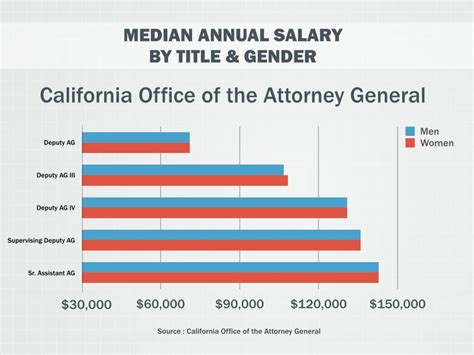For many ambitious legal professionals, reaching the pinnacle of public service is the ultimate career goal. Few positions embody this more than that of an Attorney General. While the U.S. Attorney General role is a singular, cabinet-level appointment, the broader career landscape includes 50 State Attorneys General and thousands of high-ranking lawyers within the Department of Justice.
These prestigious roles come with significant responsibility and a salary that reflects their importance. While the U.S. Attorney General's salary is a fixed, six-figure sum, compensation for state-level and other senior government attorneys can vary widely, often ranging from $110,000 to over $245,000 annually.
This guide will break down the salary for the U.S. Attorney General, explore the compensation for State Attorneys General, and analyze the key factors that influence the earnings of top-tier government lawyers.
What Does an Attorney General Do?


It's crucial to distinguish between the federal and state roles.
The Attorney General of the United States is the chief law enforcement officer of the U.S. government and the head of the Department of Justice (DOJ). Appointed by the President and confirmed by the Senate, this individual acts as the primary legal advisor to the President and their cabinet. Key responsibilities include:
- Representing the United States in legal matters.
- Overseeing federal law enforcement agencies like the FBI, DEA, and the Bureau of Prisons.
- Recommending federal judicial appointments.
- Advising the President on all legal matters.
A State Attorney General is the chief legal officer for their respective state. While their duties vary by state constitution, they generally include:
- Representing the state and its agencies in court.
- Issuing formal legal opinions to state officials.
- Enforcing consumer protection, antitrust, and environmental laws.
- Overseeing local prosecutors and state law enforcement.
Attorney General Salary: Federal vs. State


The salary for an Attorney General is not determined by market forces in the same way as a private-sector job. Instead, it is set by government statute.
### The U.S. Attorney General Salary
The salary for the Attorney General of the United States is determined by the U.S. Congress and is set at Level I of the Executive Schedule. As of 2024, the annual salary for Executive Schedule Level I positions is $246,400.
- Source: U.S. Office of Personnel Management (OPM), "Salary Table No. 2024-EX"
This is a fixed salary for all cabinet-level positions, including the Secretary of State and Secretary of the Treasury. It does not include bonuses or performance-based pay.
### State Attorney General Salaries
Salaries for State Attorneys General vary dramatically, as they are set by each state's legislature. This results in a wide compensation range across the country.
- A typical salary range for a State Attorney General is between $110,000 and $180,000.
- According to a 2023 report from the Council of State Governments, the highest-paid Attorney General is in New York (approximately $210,000), while some states in the lower tier pay closer to $95,000.
- Salary aggregators reflect this variance. Salary.com reports a median salary for State Attorneys General around $151,101, but this can be heavily influenced by the data available from different states.
Key Factors That Influence Salary for Senior Government Attorneys


While the top Attorney General roles have fixed salaries, the journey to get there involves a long legal career. For the thousands of other high-level attorneys working in the Department of Justice or state attorney general offices, several factors influence their earning potential.
###
Level of Education
A Juris Doctor (J.D.) degree from an accredited law school is the mandatory educational requirement. While the degree itself is the baseline, the prestige of the institution can play a significant role. Graduates from top-tier law schools often have a competitive advantage when applying for coveted positions within the Department of Justice, which can lead to faster career progression and higher-level (and higher-paying) roles.
###
Years of Experience
Experience is arguably the most critical factor. The U.S. Attorney General and State Attorneys General are typically seasoned legal professionals with decades of experience as prosecutors, judges, or partners at major law firms.
For career government attorneys within the DOJ, salary is directly tied to experience through the federal government's General Schedule (GS) pay scale.
- A new law school graduate might start as an Assistant U.S. Attorney at a GS-11 level.
- With several years of experience, they can advance to GS-15, the highest level on the standard scale, with salaries (including locality pay) often exceeding $190,000 (Source: OPM, 2024 GS Pay Scale).
- The most senior, non-political positions fall under the Senior Executive Service (SES), where salaries can be even higher.
###
Geographic Location
For state-level legal careers, location is paramount. As noted, State AG salaries are set by the state legislature, leading to vast differences between, for example, California and Montana.
For federal attorneys, the government uses a locality pay system to adjust salaries based on the cost of living in different regions. An Assistant U.S. Attorney working in a high-cost area like San Francisco or New York City will earn a significantly higher salary than a counterpart in a lower-cost area like Omaha, Nebraska, even if they are at the same GS grade.
###
Sector: Public vs. Private
This is a major consideration. While a salary over $200,000 is high for a public service role, it is often substantially less than what an individual with the qualifications of a U.S. Attorney General could earn in the private sector. A senior partner at a top international law firm can easily earn over $1 million annually.
Many top government lawyers make a conscious trade-off, choosing public service for the unique nature of the work, the sense of civic duty, and the power to effect change, rather than for maximum financial gain.
###
Area of Specialization
Within the vast legal world of government, certain specializations are in high demand and can lead to more senior roles. Expertise in areas like cybersecurity law, national security, constitutional law, and complex financial fraud is highly valued within the Department of Justice. Developing a reputation in one of these critical fields can accelerate career advancement and place a lawyer on the path toward senior leadership positions.
Job Outlook


The U.S. Bureau of Labor Statistics (BLS) projects that employment for all lawyers will grow by 8 percent from 2022 to 2032, which is faster than the average for all occupations. The BLS anticipates about 39,100 openings for lawyers each year, on average, over the decade.
However, it's essential to put this in context. While the legal field as a whole is growing, positions at the level of Attorney General or senior leadership within the DOJ are exceptionally rare and fiercely competitive. These are not entry-level jobs; they are the culmination of a long and distinguished career in law and public service. The path is challenging, but for those who succeed, the rewards—both in terms of impact and professional achievement—are immense.
Conclusion


Pursuing a career as a top government lawyer is a marathon, not a sprint. While the U.S. Attorney General's salary is a fixed and substantial sum of $246,400, the broader career path offers valuable insights for aspiring legal professionals.
Here are the key takeaways:
- Distinct Roles, Different Pay: The U.S. Attorney General's salary is federally set, while State Attorney General salaries vary widely by state.
- Experience is King: Decades of high-level legal experience are a prerequisite for these top roles.
- Public Service is a Choice: Government legal salaries are high but are often less than what could be earned in the private sector. The motivation is typically driven by a commitment to public service.
- The Path is Competitive: While the overall job market for lawyers is solid, securing a top-tier government position requires exceptional skill, dedication, and a stellar reputation.
For those driven by a passion for justice and a desire to serve the public at the highest level, the path toward becoming a senior government attorney, and perhaps one day an Attorney General, is one of the most challenging and rewarding in the legal profession.
